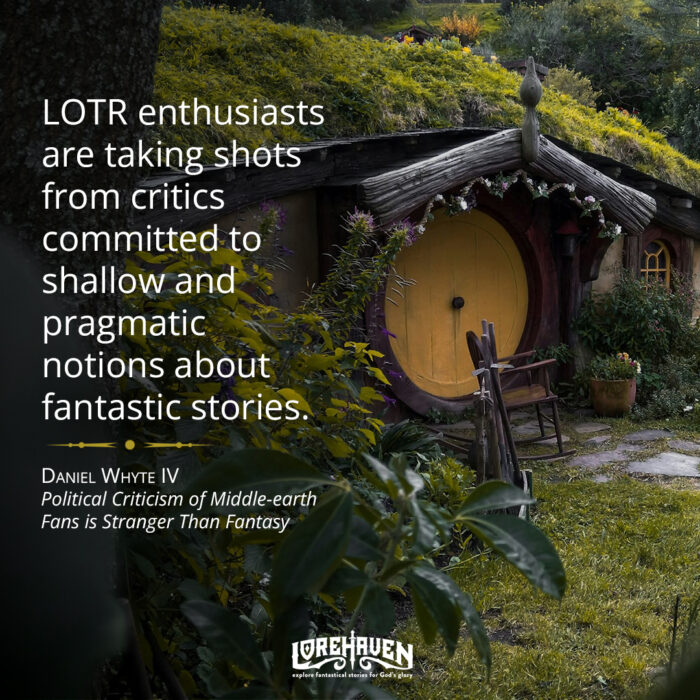Political Criticism of Middle-earth Fans is Stranger Than Fantasy
J.R.R. Tolkien’s been getting a lot of play lately, and not because the new season of Rings of Power is about to drop. Instead, the Lord of the Rings author is turning heads because Republican vice-presidential nominee J.D. Vance once declared Tolkien’s work to be a major influence on his “conservative worldview.”1
That statement deserves plenty of unpacking. But the general vibe of some major media outlets has been something like this: Vance’s politics makes everything he likes suspicious, therefore everyone who likes the same things is also suspect.
Such bizarre logic is nothing new. Critics also hold in distaste Italian Prime Minister Giorgia Meloni’s love of Tolkien’s literature. The European conservative political variant is such a Tolkien-head that she quoted Faramir in a speech rallying support for Ukraine and opened a touring Tolkien exhibit in Rome dressed as Galadriel. (One media outlet described the exhibit as Meloni’s gift to herself, but honestly, you go girl.)
Does it bother me that Tolkien’s name and work are getting rucked through the mire of the modern political hellscape? Yes. Does it bother me that people are suddenly considered weirdo extremists for liking Middle-earth, investing in companies named after Aragorn’s sword, and nicknaming their friends after hobbits? Also yes.
But I’m more bothered by critics leveling their aim at the entire genre of fantasy, and casting those who enjoy life-giving, inspirational truths in fantastic stories—truths that apply to politics as much as anywhere else—as somehow outlandish.
Political science professor Marco Tarchi said of the Italian prime minister: “At a time when you have gone via the ballot box to a dominant position in society, it is pretty odd to remain bound to this sort of mythology.” Huh.
Meanwhile, Christian author Dr. Karen Swallow Prior—who has admitted she “really dislike[s]” fantasy2—recently suggested that Lord of the Rings fans represent a phenomenon unique to today’s polarized age. The English literature professor said, “The official ascent of the Fantasy Generation may well be marked by the nomination of J.D. Vance for vice president of the United States.”3 Double-huh.
“The Fantasy Generation”? Really? I like to think we’ve been around for a while. Current fantasy lovers aren’t any more the Fantasy Generation than any other generation of folks who engaged with fantastic story-worlds. Certainly, today’s fans have access to a critical mass of fantasy books, movies, and television shows. But we also see a critical mass of content from every other genre imaginable (and even some not-so-pleasant to imagine). This is not a result of some new growth of cringe LOTR fans who can’t discern between Middle-earth and modern earth. It’s a result of our rapidly regurgitating media environment.
Fantasy isn’t having a moment just because J.D. Vance is really into the genre’s defining work. (He also cites a love for C.S. Lewis. And if you think this is a hill I’m dying on, just wait till the critics come for the Narnia nerds.) Nor is Tolkien suddenly problematic because folks across political aisles love his work. Rather, people resonate with the timeless themes reflected in Lord of the Rings. In an age where it seems each day brings a new darkness to threaten the fabric of our communities, we’re inspired to cling to stories that embody deep beliefs and celebrate a simpler life.
Beloved stories with timeless themes have a way of burrowing into one’s psyche and arising unbidden time and time again. Certainly, some will misinterpret Tolkien’s tales or use them to argue in bad faith. This is not a miscreance unique to fantasy. But if we argue that an entire generation’s love for a particular story is somehow suspect because of a few people’s political, social, cultural, or religious views, then we fundamentally misunderstand the nature of fantasy.
In fantasy, audiences are taken out of their own worlds and returned to themselves. The effects of what they experience in the fantasy world will play out differently in the real world for each person. For some, an abiding aesthetic interest in elves and dwarves might manifest. For others, Tolkien’s words will color their vision of reality. Still others will apprehend valuable moral, spiritual, and psychological lessons which amend their worldview and transform their behavior.
My Shire might not be yours, nor your Mordor mine. But we all can see ourselves defending our homes, our traditions, our family and friends from complicated and fearsome intrusions.
In the current political milieu, critics suddenly invested in anti-fantasy and fantasy-critical narratives are the real oddballs. They’re missing the whole point. Perhaps J.D. Vance rocking a Galadriel fit at a new Tolkien exhibit will drive that point home.
- Editor’s note, just in case: Lorehaven explores fantastical stories for God’s glory. Many of our creators also enjoy cultural apologetics and even some political observations. However, we do not engage with specific political personalities, platforms, or policies. Any politicians named here are with specific reference to the LOTR fandom. ↩
- In 2017 she wrote, “I dislike fantasy. Really dislike it. I don’t read Tolkien either …” She has also expressed “puzzlement” over “an overwhelming preference by evangelicals for fantasy literature.” ↩
- “JD Vance’s ascent marks the rise of the Fantasy Generation,” Karen Swallow Prior at Religion News Service, July 25, 2024. ↩






























Amen. Great article!
Tolkien’s stories are timeless which is why they have appealed to generations of readers since The Hobbit was published in 1937. It’s almost as if these critics have never read Tolkien, or know the history of his books. Tolkien was popular with the counter-culture of the ’60s and ’70s, so are the anti-establishment politicians of our time who like Tolkien the new counter-culture?